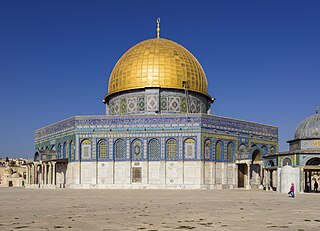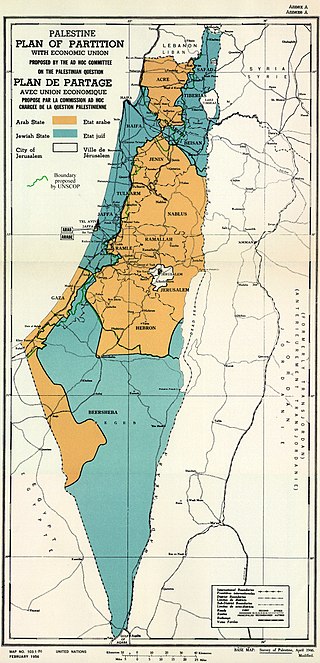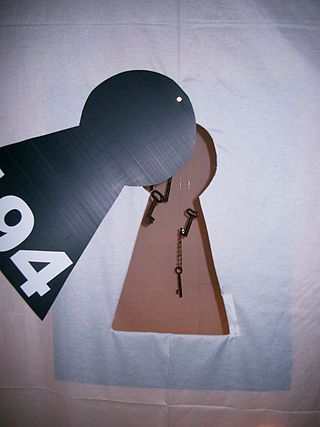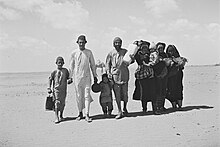
The history of the State of Palestine describes the creation and evolution of the State of Palestine in the West Bank and Gaza Strip.
Palestinian refugees are citizens of Mandatory Palestine, and their descendants, who fled or were expelled from their country over the course of the 1947–1949 Palestine war and the Six-Day War. Most Palestinian refugees live in or near 68 Palestinian refugee camps across Jordan, Lebanon, Syria, the West Bank and the Gaza Strip. In 2019 more than 5.6 million Palestinian refugees were registered with the United Nations.
The right of return is a principle in international law which guarantees everyone's right of voluntary return to, or re-entry to, their country of origin or of citizenship. The right of return is part of the broader human rights concept freedom of movement and is also related to the legal concept of nationality. While many states afford their citizens the right of abode, the right of return is not restricted to citizenship or nationality in the formal sense. It allows stateless persons and for those born outside their country to return for the first time, so long as they have maintained a "genuine and effective link".
In the 20th century, approximately 900000 Jews migrated, fled, or were expelled from Muslim-majority countries throughout Africa and Asia. Primarily a consequence of the 1948 Arab–Israeli War, the mass movement mainly transpired from 1948 to the early 1970s, with one final exodus of Iranian Jews occurring shortly after the Islamic Revolution in 1979–1980. An estimated 650000 (72%) of these Jews resettled in Israel.

The United Nations Partition Plan for Palestine was a proposal by the United Nations, which recommended a partition of Mandatory Palestine at the end of the British Mandate. On 29 November 1947, the UN General Assembly adopted the Plan as Resolution 181 (II).
The United Nations General Assembly Resolution 194 is a resolution adopted near the end of the 1947–1949 Palestine war. The Resolution defines principles for reaching a final settlement and returning Palestine refugees to their homes. Article 11 of the resolution resolves that
refugees wishing to return to their homes and live at peace with their neighbours should be permitted to do so at the earliest practicable date, and that compensation should be paid for the property of those choosing not to return and for loss of or damage to property which, under principles of international law or equity, should be made good by the Governments or authorities responsible.
Mizrahi Jews, also known as Mizrahim (מִזְרָחִים) or Mizrachi (מִזְרָחִי) and alternatively referred to as Oriental Jews or Edot HaMizrach, are a grouping of Jewish communities comprising those who remained in the Land of Israel and those who existed in diaspora throughout and around the Middle East and North Africa (MENA) from biblical times into the modern era.
The International law bearing on issues of Arab–Israeli conflict, which became a major arena of regional and international tension since the birth of Israel in 1948, resulting in several disputes between a number of Arab countries and Israel.
The Lausanne Conference of 1949 was convened by the United Nations Conciliation Commission for Palestine (UNCCP) from 27 April to 12 September 1949 in Lausanne, Switzerland. Representatives of Israel, the Arab states Egypt, Jordan, Lebanon and Syria, and the Arab Higher Committee and a number of refugee delegations were in attendance to resolve disputes arising from the 1948 Arab–Israeli War, mainly about refugees and territories in connection with Resolution 194 and Resolution 181.
The Arab–Israeli conflict began in the 20th century, evolving from earlier Intercommunal violence in Mandatory Palestine. The conflict became a major international issue with the birth of Israel in 1948. The Arab–Israeli conflict has resulted in at least five major wars and a number of minor conflicts. It has also been the source of two major Palestinian uprisings (intifadas).
Palestinian Jews or Jewish Palestinians were the Jewish inhabitants of the Palestine region prior to the establishment of the State of Israel in 1948.
Jews Indigenous to the Middle East and North Africa (JIMENA) is a non-profit organization headquartered in San Francisco, California that is dedicated to the preservation of Mizrahi and Sephardi culture and history, and seeks to educate the public and advocate for Jewish refugees from the Middle East.

The Palestinian right of return is the political position or principle that Palestinian refugees, both first-generation refugees and their descendants, have a right to return and a right to the property they themselves or their forebears left behind or were forced to leave in what is now Israel and the Palestinian territories during the 1948 Palestinian expulsion and flight and the 1967 Six-Day War.
During the 1948 Palestine war in which the State of Israel was established, around 700,000 Palestinian Arabs or 85% of the total population of the territory Israel captured fled or were expelled from their homes by Israeli forces. The causes for this mass displacement is a matter of great controversy among historians, journalists, and commentators.
Palestinian people have a history that is often linked to the history of the Arab Nation. Upon the advent of Islam, Christianity was the major religion of Byzantine Palestine. Soon after the rise of Islam, Palestine was conquered and brought into the rapidly expanding Islamic empire. The Umayyad empire was the first of three successive dynasties to dominate the Arab-Islamic world and rule Palestine, followed by the Abbasids and the Fatimids. Muslim rule was briefly challenged and interrupted in parts of Palestine during the Crusades, but was restored under the Mamluks.

In 1948, more than 700000 Palestinian Arabs – about half of prewar Mandatory Palestine's Arab population – fled from their homes or were expelled by Zionist militias and, later, the Israeli army during the 1948 Palestine war, following the Partition Plan for Palestine. The expulsion and flight was a central component of the fracturing, dispossession, and displacement of Palestinian society, known as the Nakba. Dozens of massacres were conducted by Israeli military forces and between 400 and 600 Palestinian villages were destroyed. Village wells were poisoned in a biological warfare programme and properties were looted to prevent Palestinian refugees from returning. Other sites were subject to Hebraization of Palestinian place names. These activities were not necessarily limited to the year 1948.
The Menarsha synagogue attack took place on 5 August 1949 in the Jewish quarter of Damascus, Syria. The grenade attack claimed the lives of 12 civilians and injured about 30. Most of the victims were children.

Mandatory Palestine was a geopolitical entity that existed between 1920 and 1948 in the region of Palestine under the terms of the League of Nations Mandate for Palestine.

The 1948 Palestine war was fought in the territory of what had been, at the start of the war, British-ruled Mandatory Palestine. During the war, the British withdrew from Palestine, Zionist forces conquered territory and established the State of Israel, and over 700,000 Palestinians fled or were expelled. It was the first war of the Israeli–Palestinian conflict and the broader Arab–Israeli conflict.
The Nakba was the ethnic cleansing of Palestinians in Mandatory Palestine during the 1948 Palestine war through their violent displacement and dispossession of land, property and belongings, along with the destruction of their society, culture, identity, political rights, and national aspirations. The term is also used to described the ongoing persecution and displacement of Palestinians by Israel. As a whole, it covers the shattering of Palestinian society and the long-running rejection of the right of return for Palestinian refugees and their descendants.






